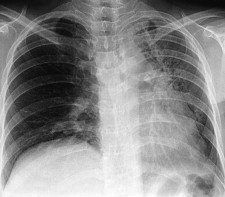It is well established that women with certain genetic mutations known as BRCA1 or BRCA2 are at an increased risk of developing breast cancer. Now, a study published in BMJ has found that procedures involving radiation to the chest, such as mammograms or chest X-rays, may significantly increase the already high risk of breast cancer these women face.
 The study comes from the Netherlands Cancer Institute, where researchers monitored the health of nearly 2,000 European women between 2006 and 2009. All of the women were older than 18 years and carried the BRCA1 or BRCA2 mutation. Of the 43 percent of this group that was ultimately diagnosed with breast cancer, those who had undergone a radiation scan to the chest before age 30 showed the most startling increase in risk: 43 percent higher for those who had received chest radiation between the ages of 20 and 29, and 62 percent for those who had been screened before age 20.
The study comes from the Netherlands Cancer Institute, where researchers monitored the health of nearly 2,000 European women between 2006 and 2009. All of the women were older than 18 years and carried the BRCA1 or BRCA2 mutation. Of the 43 percent of this group that was ultimately diagnosed with breast cancer, those who had undergone a radiation scan to the chest before age 30 showed the most startling increase in risk: 43 percent higher for those who had received chest radiation between the ages of 20 and 29, and 62 percent for those who had been screened before age 20.
The researchers believe that women with BRCA1/2 mutations might be especially vulnerable to any DNA damage caused by X-rays or CT scans, since those mutations affect the body s ability to repair DNA breaks that can go on to produce abnormal cells.
Based on their study, the authors suggest that women under 30 who carry the BRCA1 or 2 mutation should avoid exposure to such scans when a diagnosis (of any kind) is needed. An MRI, which uses no radiation, is the better option.
Young women who either know they carry BRCA1 or BRCA2, or have a strong family history of breast cancer, should discuss this greater propensity with their physicians before allowing any radiation exposure to the chest area, suggests ACSH's Dr. Ruth Kava.


